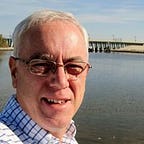Inconvenient Truth of Geologic Catastrophe — Cuvier
Georges Cuvier dreamed of raising the young science of geology to the exalted position held by astronomy and physics. However, he was unprepared for what geology would reveal. During the period of the Enlightenment, in the 18th century, astronomers built on Newton’s laws of gravity and motion to encompass the solar system, extending the limits of human understanding over huge distances. The predictable, clockwork motion of the planets revealed by Simon Laplace and his colleagues reinforced the Enlightenment ideal of a well-ordered universe governed by natural law. Cuvier hoped, that similarly careful study of the Earth would extend scientific knowledge back in time beyond the limits of human history — even counting history remembered only in myth.
“We admire the force with which the human spirit has measured the movements of planets which nature seemed to have concealed for ever from our view. Human genius and science have stepped beyond the limits of space; some observations developed by reasoning have unveiled the mechanical workings of the world. Would there not also be some glory for human beings to know how to step beyond the limits of time and to recover, through some observations, the history of this earth and a succession of events which have preceded the birth of the human genus?” — Georges Cuvier (1822)
The geology of the region surrounding Paris, where Cuvier lived and worked, bears a marked resemblance to the exquisite layered pastry that is appropriately known as a mille-feuille. Like the pastry, the ground below Paris is composed of discrete layers of different types of rock, one lying on top of the other. Cuvier uncovered this structure by carefully mapping the extent of each layer where it lay exposed at the surface or in excavations. He used fossils unique to each type of rock to identify each layer definitively.
The fossils also told Cuvier something about how each layer of rock was made, and this revealed drastic changes in the landscape — the region around Paris has been covered by water in its recent geologic history and conditions fluctuated between marine saltwater and inland freshwater several times. Finally, the sequence of fossils, from the youngest near the surface to the oldest at depth, convinced Cuvier that species have gone extinct and hinted at the creation of new species by some mechanism, as yet unknown.
Thus, Cuvier’s investigations into the structure of the Paris Basin opened a window into the Earth’s history and set the stage for revolutionary theories on the origin of species. Here was clear evidence that, over the span of geologic history, the reign of well-ordered nature had not always prevailed. The prehistory of the region was rent by catastrophic events that caused species to go extinct and radically reformed the surface of the Earth.
Cuvier refused to pursue the broader implications of these findings. The traumatic upheaval of the French Revolution, in the final decade of the 18th century, had left its mark on Cuvier as a young man. As an adult, Cuvier sought to impose order where he could, apparently even at the expense of suppressing his talent for rational analysis. When pushed, he adopted the principled position that there was no value in speculating beyond the limits of the facts that had been empirically determined. However, Cuvier was more than happy to engage in speculation on other topics of inquiry — he was renowned for his ability to conjure the details of an unseen species, including details of their diet, from the scant evidence of a few fossilized bones.
Georges Cuvier is one of the 72 scientists and engineers named on the Eiffel Tower.
Reference:
Cuvier, G. A discourse on the revolutions of the surface of the globe, and the changes thereby produced in the animal kingdom (1831 American edition) http://www.google.com/books?id=mqAaAAAAYAAJ&pg=PR4
